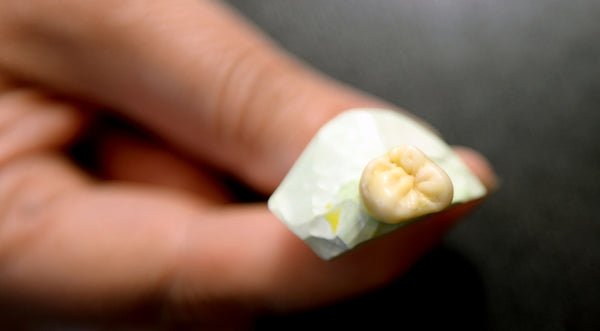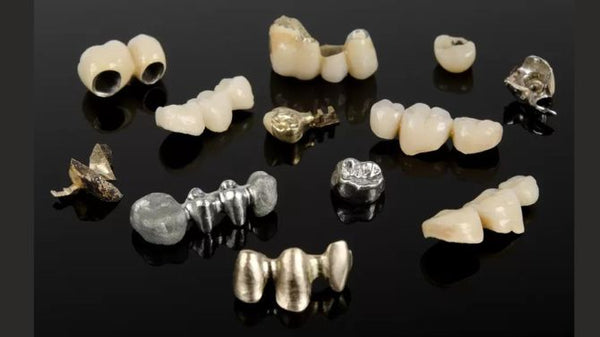
What to Do If Your Dental Crown Falls Off
Dental crowns are often used. A dental crown is used to repair teeth broken by disease or accident. But dental crowns may be damaged, just as genuine teeth might, and there are situations where temporary crowns fall off. If your dental crown—either permanent or temporary—falls off, follow these instructions.
What to Do if Your Crown Falls Off on a Weekend or at Night
An emergency dental consultation is needed if your dental crown falls off. On the other hand, you will most likely be able to obtain an appointment the next day if your dental crown comes off over the weekend or in the evening. Don't panic, however. Follow these steps if your dental crown falls off at night or on a weekend.

-
Stay Calm
The first thing to remember is to remain calm before discussing what to do if your dental crown comes off. Losing a dental crown might be alarming, but don't worry—it can be restored. Although there may be some initial discomfort, this damage is temporary.
-
Inspect the Crown
The condition of your dental crown will determine how to proceed if it falls off. Try to find the crown if you can. Examine the damage closely to determine its extent. When your dentist examines you, it could be feasible to reconnect the crown if there is no tooth inside of it. It's usual to see a small amount of metal within the crown. That is the post of the crown, which keeps it firmly attached to your tooth.
-
Call Your Dentist
One of the finest things you can do if your dental crown falls off is to call your dentist as soon as possible. Inform them about the incident and ask for an emergency dental appointment. Your dentist could inquire whether you still possess the crown and in what condition. Schedule a time to have the crown replaced or reattached as soon as possible.
-
Clean the Crown
Use mild soap and water to wash the crown off gently if you still have it. Please place it in a plastic bag or another secure container to keep it clean. Remember to bring it when you see your dentist and store it securely.
-
Protect Your Tooth
Initially, your crown would have been attached to cover a damaged tooth. To safeguard the underlying tooth structures, knowing what to do if your dental crown slips off is critical. The sensitive tissue may be now exposed, making them touch-and temperature-sensitive. Get temporary dental cement from a drugstore. As directed on the packaging, carefully shape the cement around the exposed tooth.
-
Avoid Certain Foods
Even though your tooth will be momentarily protected, certain foods will cause the dental cement to come loose, expose the tooth, and damage the supporting tissues. Avoiding rough, crunchy, or chewy foods if your dental crown slips off is a good suggestion. Foods that are very hot or cold may also hurt you. Avoid these foods until you can have your crown restored by your dentist.
-
See Your Dentist
If you made an emergency dental appointment, visiting your dentist should take a little time. When you see your dentist, bring the crown along in case it can be put back on. Should the crown sustain considerable damage, a replacement crown will likely need to be placed.
Stop Dental Crowns From Falling Off Again
After learning what to do in the event that your tooth cap falls off, you may also want to find out why it came off in the first place and how to prevent it from occurring in the future. There are several reasons why dental crowns might come loose. Here are the most common:
- Decay: The crown will ultimately come loose if tooth decay eats away at the supporting tissue. Tooth decay cannot accumulate and harm the tooth structures underneath by brushing twice daily and flossing once daily.
- Impact: The crown may be forced loose by sheer force of a strong blow from contact sports. Always wear a helmet and mouthguard while participating in sports where face injuries are possible.
- Tough Foods: Your crown may be damaged if you bite down on tough foods, seeds, or other hard substances concealed in certain meals. Avoid these foods, and handle seeds and pits with caution.
- Improper Fitting: Your crown will come loose faster if it is not fitted or attached to your tooth correctly in the first place. Before seeing a dentist, read reviews online, make inquiries, and always work with an experienced dentist for restorations.
- Teeth grinding: Teeth grinding, or bruxism, may potentially damage the tooth under a crown and the crown itself. See your dentist if you have discomfort in your jaw or teeth when you get up in the morning or if it persists throughout the day. Your dental crown can decay more quickly if you grind your teeth, so addressing this issue early can help prevent the crown from coming loose.
If My Dental Crown Falls Off, Will It Damage My Tooth?
Teeth grinding, or bruxism could damage the tooth under a crown and the crown itself. See your dentist if you have discomfort in your jaw or teeth when you get up in the morning or if it persists throughout the day. Your dental crown will deteriorate more quickly if you grind your teeth, so addressing this issue early can help prevent the dental crown cement from coming loose.
How Long Do Dental Crowns Last?
Dental crowns may last ten to fifteen years, depending on several factors, including the original tooth's health, the crown's maintenance, its composition, and the crown's initial fit. You may prolong the life of your dental cap in various ways. The materials used to make your crown and its particular kind will affect how long it lasts. The dental crowns near me come in different materials and configurations, any of which might be appropriate given the appropriate circumstances.
- Metal: The rear teeth, which bear the most significant amount of pressure, are the most often restored with metal crowns. They might be constructed from gold, palladium, nickel, or chromium. Although durable and strong, these crowns are usually inappropriate for front teeth.
- Porcelain: Although they are still very sturdy, porcelain crowns do not last as long as metal crowns. These crowns are perfect for front teeth since they will look just like natural teeth. A porcelain overlay and the metal structure below might also be used for the crown.

- Resin: Although resin crowns may be less expensive than other crowns, they often only last for a short time as different crowns. These crowns are composed of a dental-grade plastic polymer that is safe to use.
- Full and Partial Crowns: Although most dental crowns completely enclose the tooth, this isn't always required. Sometimes, a smaller portion of the tooth or all four sides may be covered with a crown.
Maintain a healthy smile by brushing and flossing your teeth regularly. Although decay will damage the tooth beneath, it won't permanently weaken the crown. As a result, the crown will fit incorrectly and finally come loose. Additionally, pay attention while flossing near the dental crown. Although flossing may prevent dental decay and maintain the health of your teeth, excessive pressure might harm the crown. When flossing around your dental crown, consider using a water flosser or being extra cautious.
Hopefully, the issue does not seem as serious now that you know what to do if your dental crown falls off and how to prevent it from reoccurring.
Post-Treatment Care
After your dentist addresses the fallen-off dental cap, following their recommendations for post-treatment care is essential. This phase is crucial in ensuring the success and longevity of the restoration. Here are key points to consider:
Following Dentist-Recommended Care Instructions
Once your dentist has re-cemented, replaced, or repaired your dental crown, they will provide specific care instructions tailored to your situation. It's essential to follow these instructions diligently. This may include guidance on oral hygiene practices, dietary restrictions, and any temporary precautions to promote the proper healing and bonding of the crown. Compliance with these instructions can significantly impact the overall success of the treatment.
Scheduling Follow-Up Appointments
Your dental journey continues after the initial treatment. Scheduling and attending follow-up appointments are crucial steps in the post-treatment care process. These appointments allow your dentist to assess the healing progress, check the stability of the crown, and address any concerns or issues that may have arisen. Regular follow-ups contribute to the long-term success of your dental restoration by enabling your dentist to make timely adjustments and catch potential problems before they escalate.
Monitoring Any Changes in Oral Health
Paying close attention to your oral health after the crown reattachment is essential. Monitor for any changes, discomfort, or unusual sensations around the treated tooth. Please report any issues promptly to your dentist, as they can indicate potential complications or adjustments needed. Regular monitoring empowers you to address emerging concerns proactively and ensures that your restored tooth remains in optimal condition.
In summary, the post-treatment care phase plays a pivotal role in the overall effectiveness of dental crown restoration. By adhering to your dentist's instructions, scheduling follow-up appointments, and actively monitoring changes in your oral health, you contribute to the success of the treatment and enjoy the benefits of a healthy, functional, and aesthetically pleasing smile.
Conclusion
If your dental crown decides to make an unexpected exit, it's crucial to respond swiftly and appropriately. While a fallen-off dental crown might catch you off guard, taking the proper steps promptly and maintaining proactive dental care will help you smile confidently for years to come. Remember, a fallen-off dental crown isn't a cause for panic but a prompt call to action. Your dental health is an investment, and with the proper care, you can continue to enjoy the benefits of a bright and healthy smile. If you want to find essential dental products at an affordable price, Just visit Dental Finds to get your valuable products.

